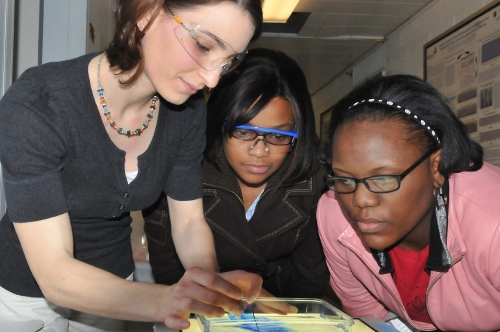
Bassam Z. Shakhashiri
Professor of Chemistry
The William T. Evjue Distinguished Chair for the Wisconsin Idea
Director, Wisconsin Initiative for Science Literacy
Department of Chemistry
University of Wisconsin-Madison
It was a privilege and a great honor to serve as president of the American Chemical Society in 2012. Only two other UW-Madison faculty members have served as ACS president—Farrington Daniels in 1953 and Charles Casey in 2004. Perhaps one day soon, one or more of the readers of this essay will become ACS president and lead the world’s largest scientific organization. I am proud to be a 50-year ACS member, and am grateful for all that the ACS continues to offer to its members, to the chemical enterprise, and to society. The success of the ACS depends on the creativity and dedication of members who are eager to enhance its offerings and accomplishments.
Science and society face grand global challenges, and it is through research, education, and innovation that progress can be made to achieve good solutions. ACS and its members can make significant contributions in advancing science and communicating science to benefit the human condition and to protect the Planet. However, proficiency or technical skill alone does not ensure responsibility and stewardship. We must ensure that the next generation of chemical scientists is both highly skilled technically and properly educated to carry on their scientific and educational work for the common good of society. In a free and civil society, people must be virtuous as well as skilled.
ACS offers professional opportunities, support, and assistance; members, in turn, can participate in serving ACS and its mission: “To advance the broader chemistry enterprise and its practitioners for the benefit of Earth and its people.”
Global Challenges
As I did when I was ACS president, I call on chemists “to help sustain Earth and its people in the face of population growth, finite resources, malnutrition, spreading disease, deadly violence, war, climate change, and the denial of basic human rights, especially the right to benefit from scientific and technological progress.” Solutions to the world’s problems demand thinking “outside the box” and encouraging radical innovation—both coupled with transformative changes in education. We must aim to affect comprehensive, fundamental, and systemic change in our own attitudes and in our behavior as scientists and as responsible citizens. Purposeful communication of the critical role of science and technology in society can help alter attitudes of the general public and can also foster collaboration among people across geographic boundaries to work together to solve global grand challenges.
Graduate Education in the Chemical Sciences
As ACS president, I formed a blue-ribbon commission to address graduate education in the chemical sciences and asked them to recommend appropriate changes in how we use our country’s vast educational, industrial, and government resources to prepare students for careers that can adapt to changing human needs over the next 50 years.

The commission was charged with answering two main questions: What are the purposes of graduate education in the chemical sciences, and what steps should be taken to ensure that graduate education addresses important societal issues as well as the needs and aspirations of graduate students. The major tasks in the charge were to consider fundamental, comprehensive, and systemic changes suitable for graduate education in the chemical sciences, and to suggest actionable approaches for enhancing the quality of graduate education at all institutions.
Five major conclusions were reached by the commission, and they are:
- Current educational opportunities for graduate students, viewed on balance as a system, do not provide sufficient preparation for their careers after graduate school.
- The system for the financial support of graduate students, as currently operated by private, institutional, state, and federal funds, is no longer optimal for national needs.
- Academic chemical laboratories must adopt best safety practices. Such practices have led to a remarkably good record of safety in the chemical industry and should be leveraged.
- Departments should give thoughtful attention to maintaining a sustainable relationship between the availability of new graduates at all degree levels and genuine opportunities for them. Replication in excess is wasteful of resources and does injustice to the investment made by students and society.
- Postdoctoral training and education is an extension of graduate education that is important for success in a variety of career paths, particularly for faculty appointments. Postdoctoral associates should be treated as the professional scientists and engineers they are. A postdoctoral appointment should be a period of accelerated professional growth that, by design, enhances scientific independence and future career opportunities.
The report is available online in both full and summary versions, as well as in print. You may also wish to watch the webcast of the briefing given to the President’s Council of Advisors on Science and Technology. Professor Robert Hamers was the UW-Madison delegate to the ACS National Invitational Conference held in September of 2013 at Georgia Tech, and is a member of an organizing committee formed to follow through with the report’s recommendations.
ACS Climate Science Initiative
A livable climate is essential for humanity, so it’s important for everyone to have a basic understanding of the atmospheric mechanism that maintains the climate. Because the mechanism is based on fundamental physics and chemistry, scientists—including chemists—bear a responsibility for understanding climate science themselves and helping others who are not scientists to be attentive to the issues relevant to maintaining the climate. These responsibilities provided the motivation in my forming the ACS Climate Science Working Group, led by Dr. Jerry Bell of the Wisconsin Initiative for Science Literacy at UW-Madison.

The initial task for the group was to develop the content of an ACS Climate Science Toolkit that deals briefly with the basic science of climate change and can be used by every ACS member. The purpose of this Toolkit is self-education. It is designed to equip you with the information and other resources necessary to develop a robust intellectual structure that can be the basis for your discussions with others.
The second and ongoing task is to articulate strategies for ACS members to use the information from the Toolkit and possible further resources in disseminating climate science information to broader audiences. These include teachers, college and university faculty, industrial scientists and business leaders, civic and religious groups, professional science and educational organizations, and elected public officials at all levels and in all branches of government. Read more about the subject in the Science Magazine editorial, “Climate Change Conversations.”
I urge you use this toolkit in your efforts to converse with fellow scientists and especially with your friends and neighbors on issues related to global warming and what you and they can do.
ACS Global Water Initiative
The Grand Challenge of Water is the creation of new, sustainable water systems for the developed and developing world. Meeting this challenge requires the efforts of chemists, collaborating with other scientists and engineers and influencing decision makers. The ACS has launched a Global Water Initiative with a working group chaired by UC-Berkeley water chemist David Sedlak (a UW-Madison alumnus) and including experts from academe and industry. The purpose is to prepare members for the challenges and opportunities that will accompany the coming revolution in water management. Read more about this Grand Challenge in Chemical & Engineering News, in this “ACS Comment” editorial, and on Maureen Rouhi’s Editor’s Page.
Communicating Science Via Demonstrations
Have you joined us for the annual ONCE UPON A CHRISTMAS CHEERY IN THE LAB OF SHAKHASHIRI show? Perhaps you have seen this program, which will mark its 45th anniversary later this year, on TV or DVD. Maybe you’ve been to or have heard of our Science is Fun presentations.

Why do we use such modes of communication with large audiences? It is because science is fundamentally a human endeavor, driven by the same impulses that motivate much of human activity: curiosity about the unknown, the thrill of discovery, delight in creativity, and the benefits derived from understanding. Fundamental, too, is the desire to share the curiosity, thrill, delight, and benefits. The desire to share is perhaps most acutely displayed by science teachers, whose deepest desire is to effectively communicate the beauty of science, both in and out of the classroom. One of the most effective means of communicating this beauty, of stimulating curiosity, and of sharing the thrill of discovery in science is through demonstrations of physical phenomena. Through my experience in presenting demonstrations, I have come to appreciate that there are characteristics common to effective demonstrations:
- Clarity of Purpose
To assure that a demonstration communicates effectively, a teacher must have a clear idea about the purpose(s) and value of presenting the demonstration. This means knowing what the demonstration is about, why it is to be used, how it should be presented and where and when it will be presented. - A Hierarchy of Teaching and Learning Chemistry
In teaching and in learning chemistry, teachers and students engage in a complex series of intellectual activities. These activities can be arranged in a hierarchy that indicates their increasing complexity. First, observing phenomena and learning facts. Second, understanding models and theories. Third, developing reasoning skills. And fourth, examining chemical epistemology. This hierarchy provides a framework for including demonstrations in the teaching of chemistry. - Presenting Effective Demonstrations
In planning to use a demonstration, I always begin by analyzing the reasons for presenting it. Whether a demonstration is spectacular or quite ordinary, I undertake to use the chemical system to achieve specific teaching goals. I determine what I am going to say about the demonstration and at what stage I should say it. Prior to the lecture, I practice doing the demonstration. By doing the demonstration in advance, I often see aspects of the chemistry that help me formulate both statements and questions that I will use in class.
Anyone can do a whiz-bang show, but what is the point? Always ask yourself first: what is it that you are communicating, and what attitude are you conveying to your audience. Be sure to have clear and worthwhile answers before you do any demonstration.
Our Responsibilities and Obligations
As I said in my message to the ACS in 2012, “We all do what we do because it interests us, it satisfies our curiosity, and we enjoy it. However, we have a responsibility to humanity as a whole.
“I expect to pass through the world but once. Any good, therefore, that I can do, or any kindness that I can show to any fellow creature, let me do it now. Let me not defer or neglect it, for I shall not pass this way again.” —Attributed to Etienne de Grellet du Mabillier (1773-1855)
I believe it is not enough for us to be just scientists; we have a responsibility to be citizens, as well. As scientist-citizens we have an obligation to use our skills for the benefit of all. That requires each of us to have and adhere to high values and virtues as scientists and citizens to advance the broader chemistry enterprise and its practitioners for the benefit of Earth and its people.”
*I have published segments of this essay in other publications:
Chemical Demonstrations, Volume 5: A Handbook for Teachers of Chemistry
Chemistry: A Key To Human Progress

I must reflect on the decision of the UW Chem Faculty to hire you in 1970, realizing that their undergraduate teaching program was an afterthought. Luckily they were willing to give you the opportunity to change things. And change you did! I have followed you success over these many years and I appreciate all that you have accomplished at UW, at ACS and in the world at large. You have enhanced chemistry and chemical education in a variety of ways. Please continue those efforts! Alchemist